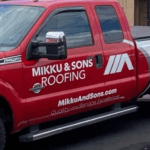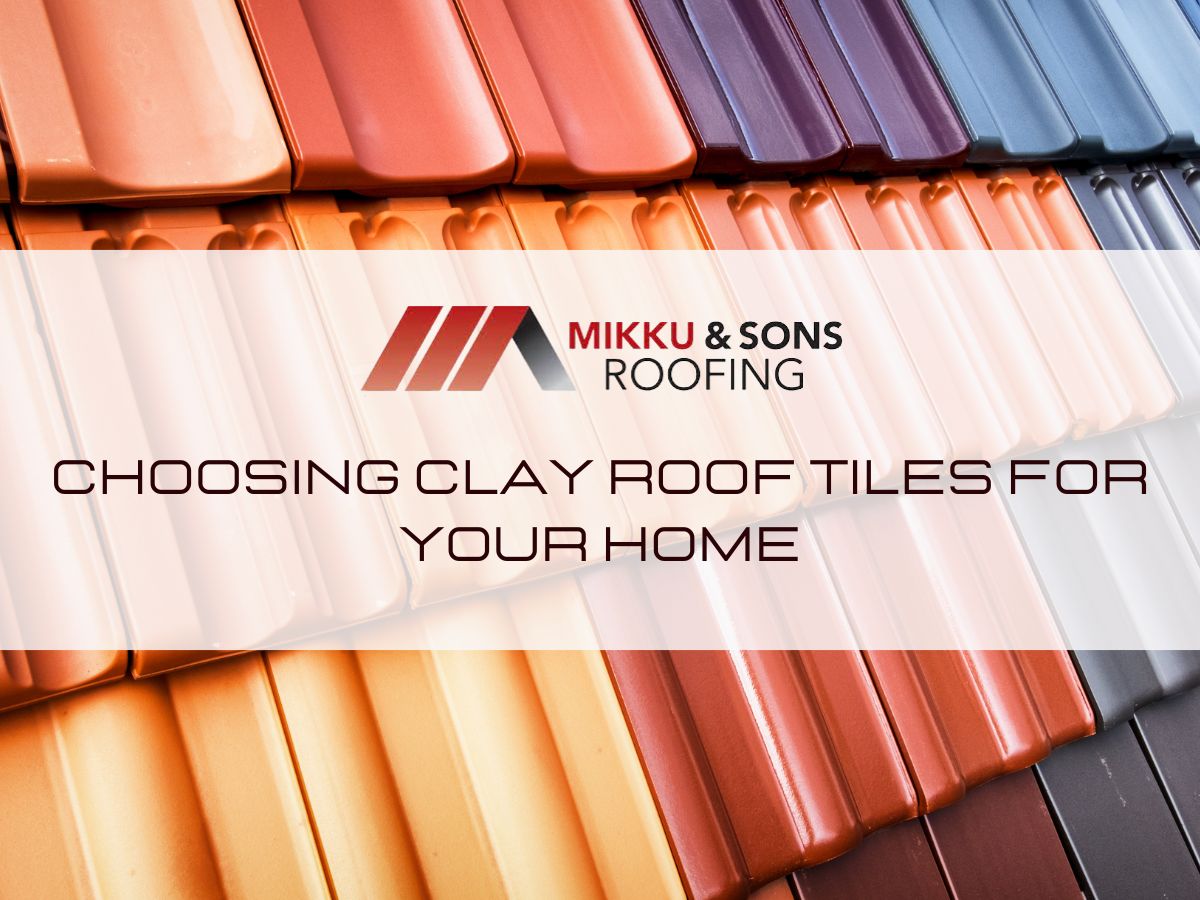
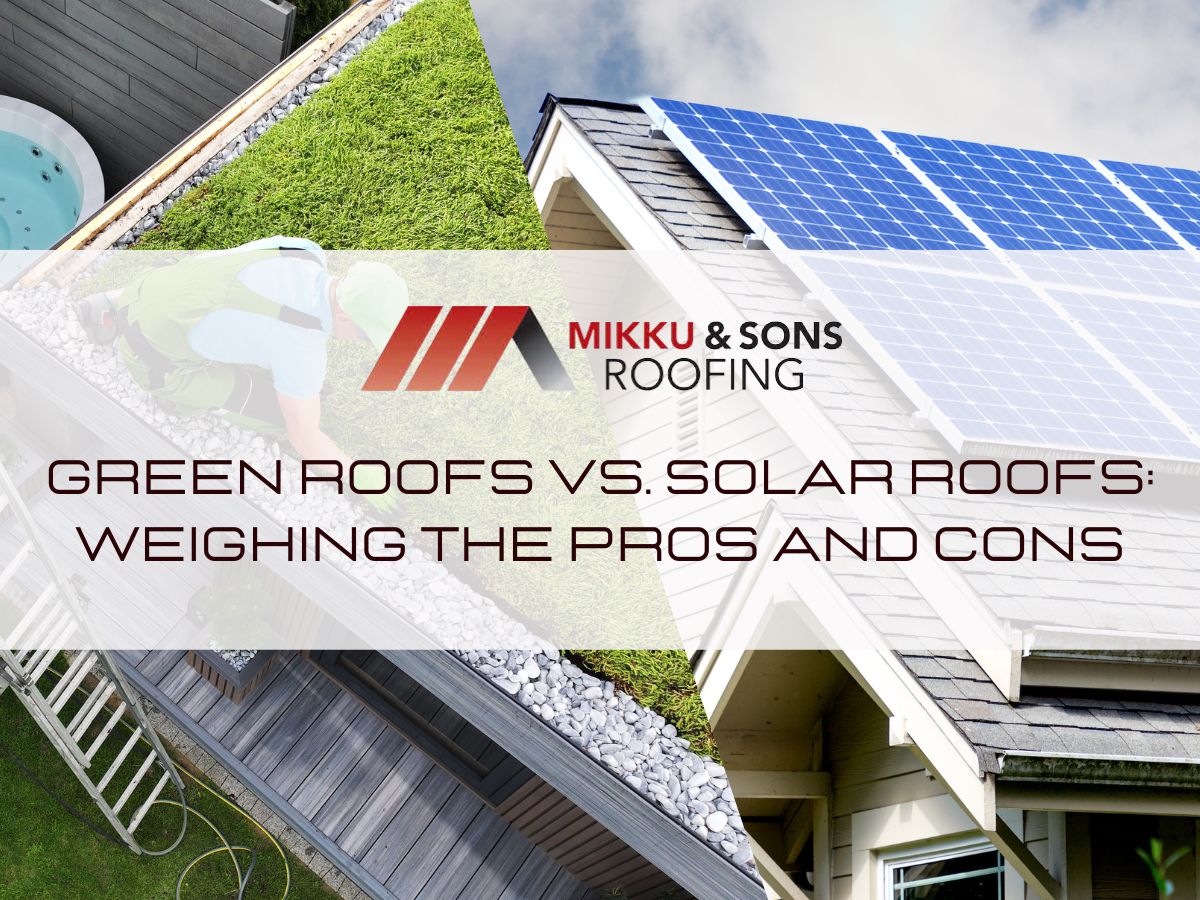
In the quest for sustainable living and environmentally conscious choices, the roofing industry has witnessed a transformative shift. As climate change concerns intensify, individuals and businesses are increasingly exploring innovative roofing solutions that not only protect their structures but also contribute to a greener future.
Two promising contenders in this eco-friendly arena are Green Roofs and Solar Roofs. These alternatives not only redefine the traditional concept of rooftops but also promise significant benefits for both the environment and the building owner.
Green roofs, a remarkable eco-friendly architectural innovation, have gained popularity for their myriad benefits. These living roofs not only enhance the aesthetics of buildings but also contribute significantly to environmental sustainability.
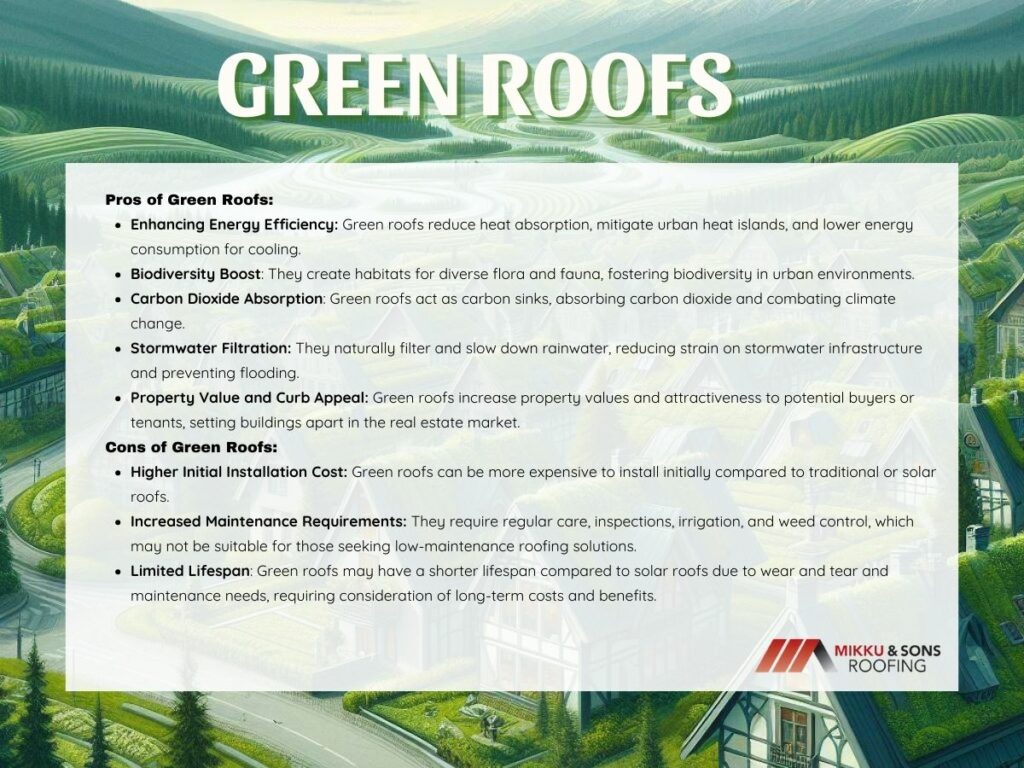
1. Enhancing Energy Efficiency
One of the standout advantages of green roofs is their ability to improve energy efficiency. By reducing heat absorption and maintaining cooler temperatures, these roofs mitigate the urban heat island effect, helping to create a more comfortable environment and lowering energy consumption for cooling.
2. Biodiversity Boost
Green roofs act as urban sanctuaries, attracting diverse flora and fauna. The lush vegetation creates a habitat for insects, birds, and even small mammals, fostering biodiversity in an otherwise concrete-dominated landscape.
3. Carbon Dioxide Absorption
In the battle against climate change, green roofs play a crucial role in absorbing carbon dioxide. The vegetation on these roofs acts as a carbon sink, helping to reduce greenhouse gas emissions and mitigate the impact of urban areas on climate change.
4. Stormwater Filtration
One of the often-overlooked benefits of green roofs is their contribution to stormwater management. The vegetation and substrate on the roofs act as natural filters, capturing and slowing down rainwater. This reduces the strain on stormwater infrastructure and helps prevent issues like flooding and soil erosion.
5. Property Value and Curb Appeal
Investing in a green roof can be a smart financial decision. These sustainable installations enhance property values and curb appeal, making buildings more attractive to potential buyers or tenants. The visual appeal of a green roof can set a property apart in the real estate market.
1. Higher Initial Installation Cost:
While the long-term benefits of green roofs are undeniable, their initial installation cost can be higher than that of traditional roofs or even solar roofs. However, it's essential to consider the potential return on investment and the overall environmental impact.
2. Increased Maintenance Requirements:
Green roofs require more care and maintenance compared to conventional roofs. Regular inspections, irrigation, and weed control are necessary to ensure the health and longevity of the vegetation. This ongoing commitment can be a drawback for those seeking low-maintenance roofing solutions.
3. Limited Lifespan:
In comparison to solar roofs, green roofs may have a shorter lifespan. The wear and tear from weather conditions and the maintenance requirements could contribute to a shorter functional life. It's crucial for potential adopters to weigh the environmental benefits against the long-term costs and maintenance efforts.
Solar roofs have emerged as a beacon of sustainable energy, transforming the way we power our homes and businesses.
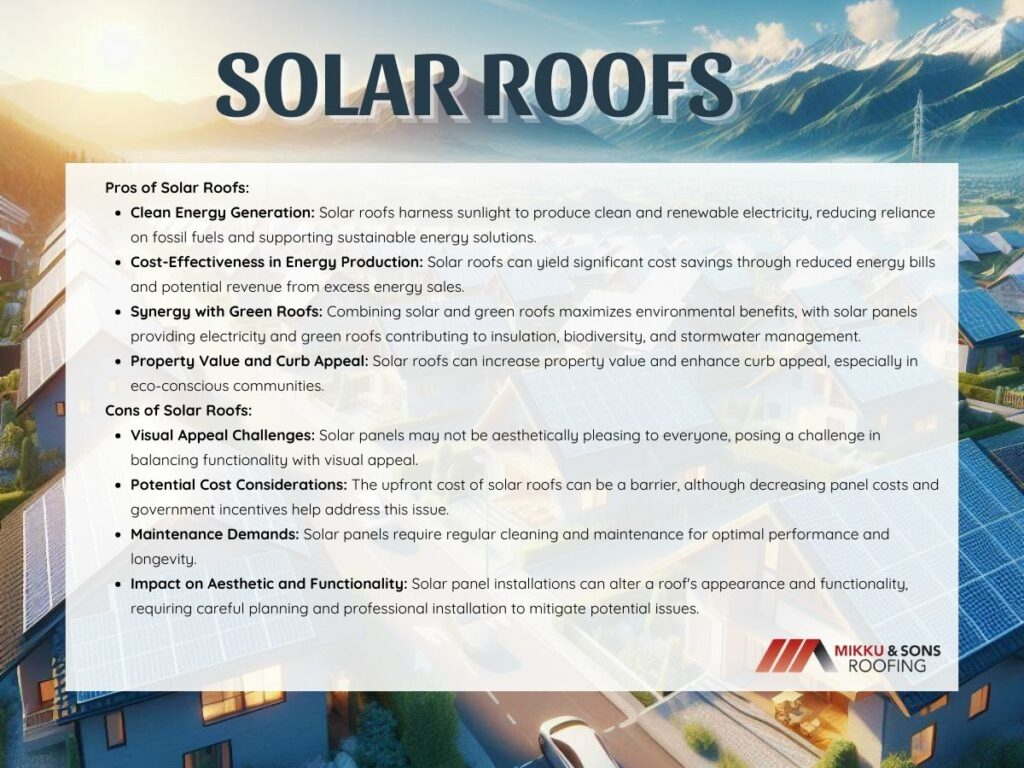
1. Clean Energy Generation:
The primary allure of solar roofs lies in their ability to harness sunlight and convert it into electricity, offering a clean and renewable energy source. This significantly reduces dependence on fossil fuels, aligning with the global push for sustainable and eco-friendly energy solutions.
2. Cost-Effectiveness in Energy Production:
Solar roofs, in terms of energy production, often prove more cost-effective than their green counterparts. The investment in solar panels can yield substantial returns through reduced energy bills and, in some cases, even allow homeowners to sell excess energy back to the grid.
3. Synergy with Green Roofs:
The dynamic duo of solar and green roofs presents a holistic approach to sustainability. By combining the two technologies, the benefits multiply. Solar panels provide electricity, while green roofs contribute to insulation, biodiversity, and stormwater management, creating a synergy that maximizes environmental and energy-related advantages.
4. Property Value and Curb Appeal:
Solar roofs can be an attractive investment for property owners, potentially increasing the overall value of a home. Beyond financial considerations, the sleek and modern appearance of solar panels can enhance curb appeal, especially in communities that value eco-conscious living.
1. Visual Appeal Challenges:
Despite their undeniable environmental benefits, solar panels may face challenges in terms of visual aesthetics. Some individuals find the appearance of solar panels less appealing compared to the lush greenery of green roofs. Striking a balance between functionality and visual appeal is crucial.
2. Potential Cost Considerations:
While solar roofs offer long-term cost savings, the initial investment can be a barrier for some. Depending on the size and complexity of the installation, solar roofs may be more expensive upfront than other roofing options. Government incentives and decreasing solar panel costs, however, are helping to address this concern.
3. Maintenance Demands:
Solar panels require maintenance to ensure optimal performance. Regular cleaning to remove dirt and debris, as well as occasional checks on the system's components, are necessary. While advancements in technology are making solar panels more durable, ongoing maintenance is essential for longevity.
4. Impact on Aesthetic and Functionality:
The installation of solar panels can alter the overall aesthetic and functionality of a roof. This includes considerations such as the weight of the panels, potential roof penetrations, and the need for a specific angle for optimal sunlight exposure. Careful planning and professional installation are crucial to mitigate these impacts.
Biosolar roofs, a harmonious fusion of greenery and solar technology, represent an innovative approach to sustainable building practices.
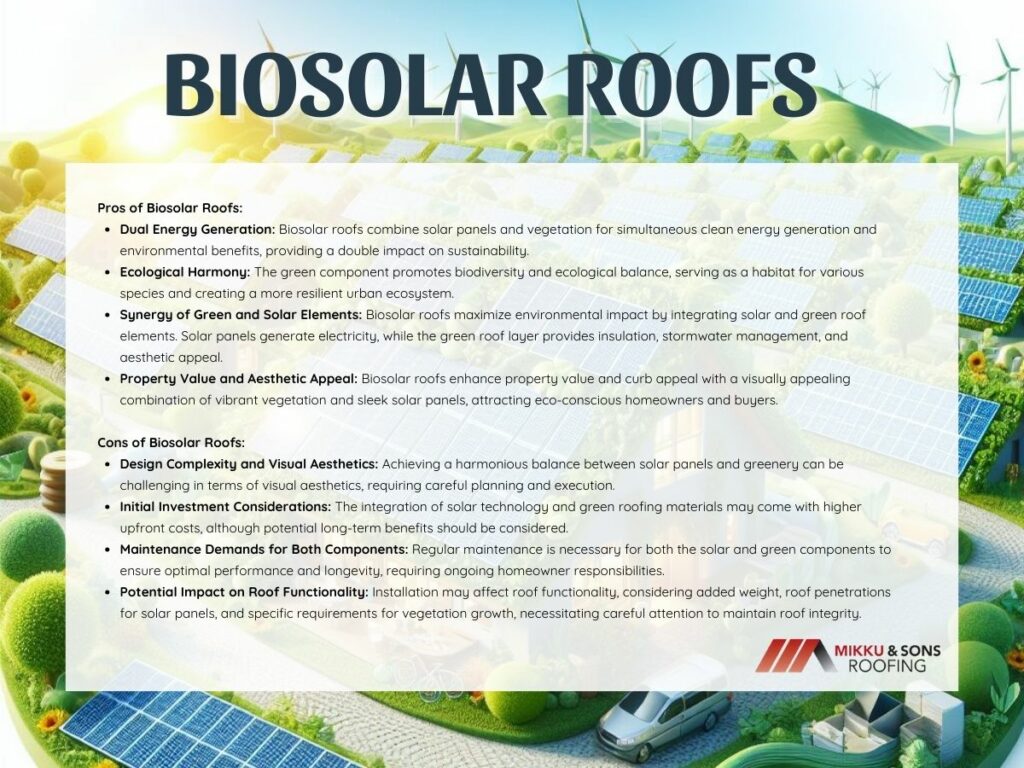
1. Dual Energy Generation
Biosolar roofs take the best of both worlds by integrating solar panels with lush vegetation. This innovative design allows for simultaneous clean energy generation from sunlight and the environmental benefits associated with green roofs. The result is a double impact on sustainability.
2. Ecological Harmony
The green component of biosolar roofs contributes significantly to biodiversity and ecological balance. The vegetation layer acts as a habitat for various species, promoting biodiversity and creating a more resilient urban ecosystem. This ecological harmony sets biosolar roofs apart in the realm of sustainable architecture.
3. Synergy of Green and Solar Elements
Biosolar roofs capitalize on the synergy between green and solar elements. While solar panels generate electricity, the green roof layer provides insulation, stormwater management, and aesthetic appeal. This dynamic integration maximizes the positive environmental impact and creates a holistic solution for sustainable living.
4. Property Value and Aesthetic Appeal
Similar to green roofs, biosolar roofs have the potential to enhance property value and curb appeal. The combination of vibrant vegetation and sleek solar panels creates a visually appealing and modern aesthetic that resonates with eco-conscious homeowners and buyers.
1. Design Complexity and Visual Aesthetics
The intricate design of biosolar roofs, while environmentally advantageous, can pose challenges in terms of visual aesthetics. Achieving a harmonious balance between the technological elements of solar panels and the organic beauty of greenery requires careful planning and execution.
2. Initial Investment Considerations
As with other innovative roofing solutions, the initial investment in biosolar roofs can be a consideration for some. The integration of solar technology and green roofing materials may incur higher upfront costs, though potential long-term benefits should be weighed against this initial expense.
3. Maintenance Demands for Both Components
Biosolar roofs necessitate maintenance for both the solar and green components. Regular checks on solar panels and vegetation care are essential to ensure optimal performance and longevity. Homeowners considering biosolar roofs should be prepared for ongoing maintenance responsibilities.
4. Potential Impact on Roof Functionality
The installation of biosolar roofs may impact the functionality of the roof structure. Considerations such as added weight, roof penetrations for solar panel installation, and the specific requirements for vegetation growth need careful attention to avoid compromising the integrity of the roof.
Green roofs offer biodiversity havens and carbon sequestration, while solar roofs champion clean energy. As we look ahead, the synthesis of these technologies in innovative solutions like biosolar roofs beckons. However, for those seeking a powerful blend of sustainability and energy generation, the evolution leads to a compelling choice – roof replacement with solar panels.
This transformative step not only enhances sustainability but also empowers homes and businesses with a clean and renewable energy source, marking a significant stride toward a greener tomorrow.
